中考英语:语法填空13组核心考点
江苏中考英语复习之13个核心语法
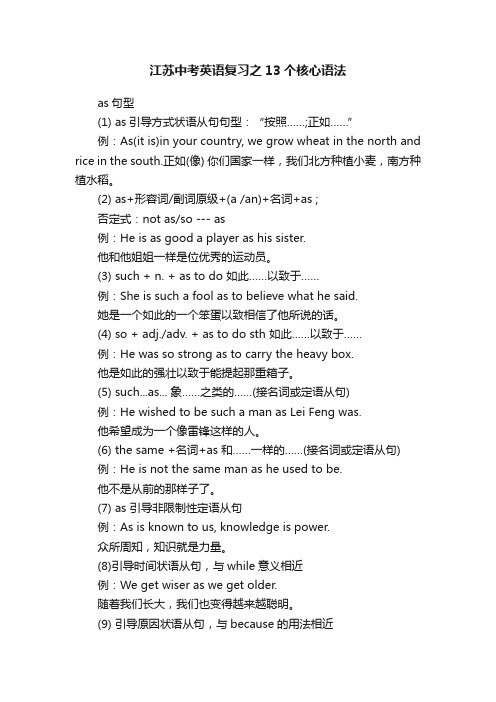
江苏中考英语复习之13个核心语法as句型(1) as引导方式状语从句句型:“按照……;正如……”例:As(it is)in your country, we grow wheat in the north and rice in the south.正如(像) 你们国家一样,我们北方种植小麦,南方种植水稻。
(2) as+形容词/副词原级+(a /an)+名词+as ;否定式:not as/so --- as例:He is as good a player as his sister.他和他姐姐一样是位优秀的运动员。
(3) such + n. + as to do 如此……以致于……例:She is such a fool as to believe what he said.她是一个如此的一个笨蛋以致相信了他所说的话。
(4) so + adj./adv. + as to do sth 如此……以致于……例:He was so strong as to carry the heavy box.他是如此的强壮以致于能提起那重箱子。
(5) such...as... 象……之类的……(接名词或定语从句)例:He wished to be such a man as Lei Feng was.他希望成为一个像雷锋这样的人。
(6) the same +名词+as 和……一样的……(接名词或定语从句)例:He is not the same man as he used to be.他不是从前的那样子了。
(7) as 引导非限制性定语从句例:As is known to us, knowledge is power.众所周知,知识就是力量。
(8)引导时间状语从句,与while意义相近例:We get wiser as we get older.随着我们长大,我们也变得越来越聪明。
(9) 引导原因状语从句,与because的用法相近例:As it was getting very late, we soon turned back.因为越来越迟了,所以我们不久就回来了。
中考英语语法填空知识点(大全)

中考英语语法填空知识点(大全)一、初三中考语法填空(含答案详细解析)1.阅读下面短文,在空白处填入一个适当的词,或填入括号中所给单词的正确形式。
Today almost everyone knows computers and the Internet. If I ask you" What is the most important in your life? ", maybe you will say" Computers and the Internet".The________(one)computer was made in 1946. It was very big but it worked________(slow). Today computers are getting smaller and smaller. But________work faster and faster. What can computers do? A writer has said, "People can't live________computers today."The Internet came a little later than computers. It is about twenty-three years later than computers. But now it can________(find) almost everywhere. We can use it to read books, write letters, do________(shop), play games or make friends.Many students like the Internet very much. They often surf the Internet as soon as they are free. They make friends on the Internet and maybe they have never seen these friends. They don't know their real________(name), ages, and even sex(性别). They are so________(interest) in making the "unreal friends" that they can't put their hearts into study. Many of them can't catch up with others on many subjects________of that.We can use computers and the Internet to learn more about the world. But at________same time, we should remember that not all the things can be done by computers and the Internet.【答案】first;slowly;they;without;be found;shopping;names;interested;because;the【解析】【分析】文章大意:文章介绍了电脑的发明时间,以及电脑的用途。
中考英语语法填空知识点(大全)
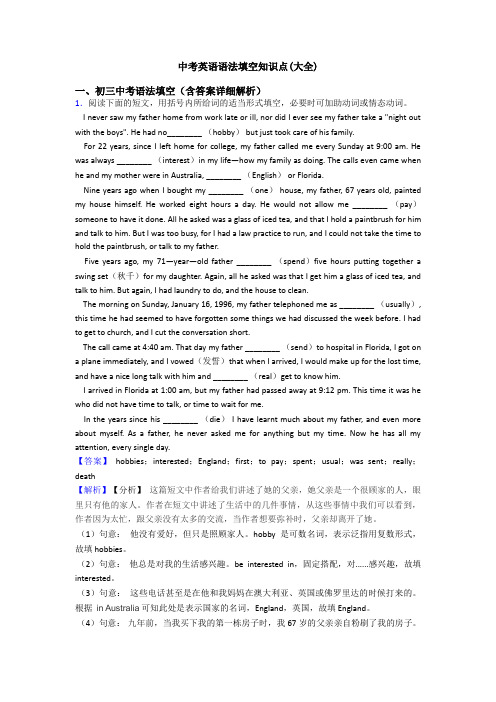
中考英语语法填空知识点(大全)一、初三中考语法填空(含答案详细解析)1.阅读下面的短文,用括号内所给词的适当形式填空,必要时可加助动词或情态动词。
I never saw my father home from work late or ill, nor did I ever see my father take a "night out with the boys". He had no________ (hobby) but just took care of his family.For 22 years, since I left home for college, my father called me every Sunday at 9:00 am. He was always ________ (interest)in my life—how my family as doing. The calls even came when he and my mother were in Australia, ________ (English) or Florida.Nine years ago when I bought my ________ (one) house, my father, 67 years old, painted my house himself. He worked eight hours a day. He would not allow me ________ (pay)someone to have it done. All he asked was a glass of iced tea, and that I hold a paintbrush for him and talk to him. But I was too busy, for I had a law practice to run, and I could not take the time to hold the paintbrush, or talk to my father.Five years ago, my 71—year—old father ________ (spend)five hours putting together a swing set(秋千)for my daughter. Again, all he asked was that I get him a glass of iced tea, and talk to him. But again, I had laundry to do, and the house to clean.The morning on Sunday, January 16, 1996, my father telephoned me as ________ (usually), this time he had seemed to have forgotten some things we had discussed the week before. I had to get to church, and I cut the conversation short.The call came at 4:40 am. That day my father ________ (send)to hospital in Florida, I got on a plane immediately, and I vowed(发誓)that when I arrived, I would make up for the lost time, and have a nice long talk with him and ________ (real)get to know him.I arrived in Florida at 1:00 am, but my father had passed away at 9:12 pm. This time it was he who did not have time to talk, or time to wait for me.In the years since his ________ (die) I have learnt much about my father, and even more about myself. As a father, he never asked me for anything but my time. Now he has all my attention, every single day.【答案】hobbies;interested;England;first;to pay;spent;usual;was sent;really;death【解析】【分析】这篇短文中作者给我们讲述了她的父亲,她父亲是一个很顾家的人,眼里只有他的家人。
中考英语语法填空知识点总结
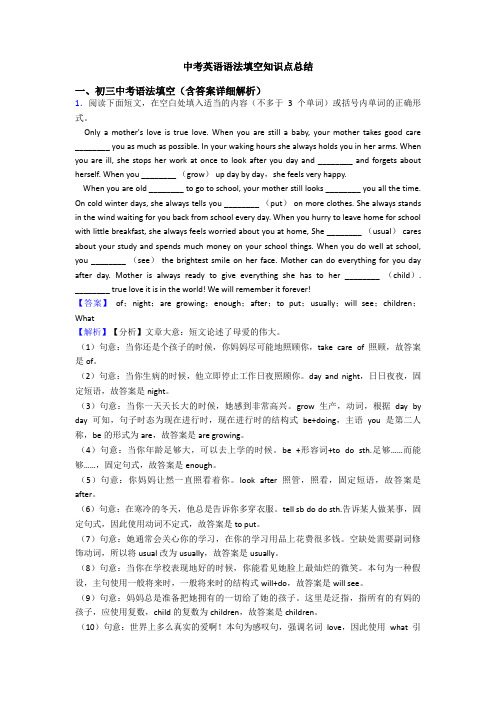
中考英语语法填空知识点总结一、初三中考语法填空(含答案详细解析)1.阅读下面短文,在空白处填入适当的内容(不多于3个单词)或括号内单词的正确形式。
Only a mother's love is true love. When you are still a baby, your mother takes good care ________ you as much as possible. In your waking hours she always holds you in her arms. When you are ill, she stops her work at once to look after you day and ________ and forgets about herself. When you ________ (grow) up day by day,she feels very happy.When you are old ________ to go to school, your mother still looks ________ you all the time. On cold winter days, she always tells you ________ (put) on more clothes. She always stands in the wind waiting for you back from school every day. When you hurry to leave home for school with little breakfast, she always feels worried about you at home, She ________ (usual) cares about your study and spends much money on your school things. When you do well at school, you ________ (see)the brightest smile on her face. Mother can do everything for you day after day. Mother is always ready to give everything she has to her ________ (child). ________ true love it is in the world! We will remember it forever!【答案】of;night;are growing;enough;after;to put;usually;will see;children;What【解析】【分析】文章大意:短文论述了母爱的伟大。
初中语法填空常考知识点
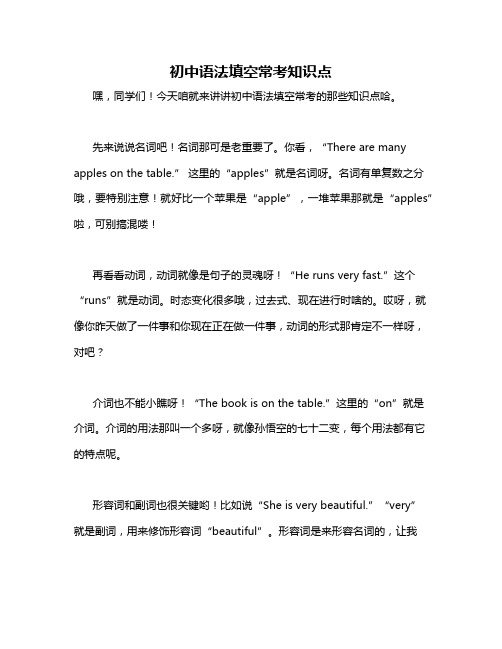
初中语法填空常考知识点嘿,同学们!今天咱就来讲讲初中语法填空常考的那些知识点哈。
先来说说名词吧!名词那可是老重要了。
你看,“There are many apples on the table.” 这里的“apples”就是名词呀。
名词有单复数之分哦,要特别注意!就好比一个苹果是“apple”,一堆苹果那就是“apples”啦,可别搞混喽!再看看动词,动词就像是句子的灵魂呀!“He runs very fast.”这个“runs”就是动词。
时态变化很多哦,过去式、现在进行时啥的。
哎呀,就像你昨天做了一件事和你现在正在做一件事,动词的形式那肯定不一样呀,对吧?介词也不能小瞧呀!“The book is on the table.”这里的“on”就是介词。
介词的用法那叫一个多呀,就像孙悟空的七十二变,每个用法都有它的特点呢。
形容词和副词也很关键哟!比如说“She is very beautiful.”“very”就是副词,用来修饰形容词“beautiful”。
形容词是来形容名词的,让我们更清楚这个东西啥样,副词呢就是给动词或者形容词帮帮忙,让表达更准确。
这就好比给食物加调料,味道会更好呢!冠词呢,就那几个“a”“an”“the”,可别小看它们呀!“I have a book.”和“I have the book.”意思可不一样哦!咱举个例子哈,老师在课堂上问:“同学们,谁能说说这里该用什么动词呀?”同学们就七嘴八舌讨论开了,“我觉得应该用这个!”“不对不对,应该用那个!”这画面多有意思呀!哎呀呀,这些知识点真的都好重要呀!大家一定要好好掌握,在做语法填空的时候就不会犯糊涂啦。
咱可不能马虎,这些都是基础呀,基础不牢,地动山摇呢!所以,大家一定要加油哦,把这些知识点都牢牢记住,在考试中拿高分呀!。
语法填空英语知识点总结

语法填空英语知识点总结一、名词名词的数: 单数和复数形式1. 一般情况下,名词变为复数形式是在词尾加-s,如:cat-cats, book-books。
2. 以-s, -ch, -sh, -x结尾的名词变为复数形式在词尾加-es, 如:bus-buses, box-boxes。
3. 以辅音字母+y结尾的名词,变复数形式时变y为i加-es, 如:baby-babies。
4. 以元音字母+y结尾的名词,变复数形式时直接在末尾加-s,如:boy-boys。
5. 以-f或-fe结尾的名词,变为复数形式时-f或-fe变为-v加-es,如:leaf-leaves, knife-knives。
6. 以o结尾的名词,变为复数形式时,在词尾加-es,如:tomato-tomatoes。
名词的所有格: 表示所属关系1. 一般情况下,在名词末尾加-’s,表示单数所有格,如:Tom’s book。
2. 如果名词是复数形式,只在名词的末尾加-’,表示复数所有格,如:students’ books。
3. 以-s结尾的复数名词,在结尾不加-s,只加-’表示所有格,如:the b oys’ shoes。
4. 单数名词以“s”结尾后加“apostrophe”(’)表所属。
如:James’ book(詹姆斯的书)名词的分类: 可数名词和不可数名词1. 可数名词:用于可数统计的名词,如:a cat, two books。
2. 不可数名词:不能单独或一定范围内统计的名词,如:milk, water。
名词的用法: 表示人或事物、概念等1. 作主语,如:Books are important.2. 作宾语,如:I like this book.3. 作定语,如:A black cat is lying in the sun.4. 作表语,如:My job is teaching.5. 作宾语补足语,如:We found him a job.二、代词1. 人称代词: 表示不同人的代词主格宾格形容词性物主代词名词性物主代词I me my/mine mineyou you your/yours yourshe/him h im his hisshe/her her her/hers hersit it its itswe us our/ours oursthey/them them their/theirs theirs2. 物主代词: 表示所属关系或指向某人或某物的代词形容词性物主代词:在名词前修饰名词,如:my book, her pen。
中考语法填空知识点总结
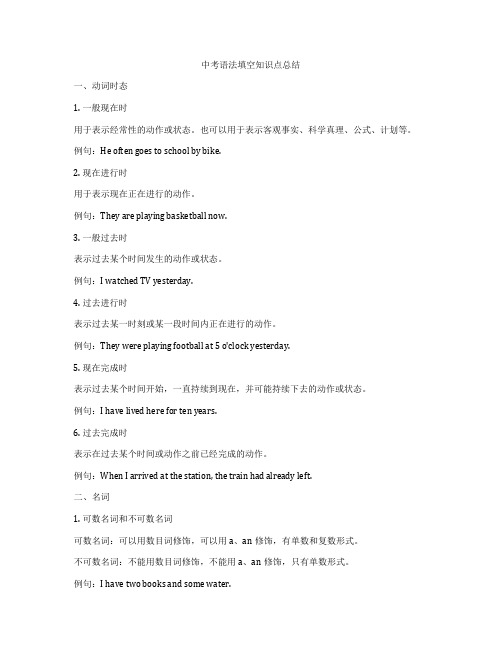
中考语法填空知识点总结一、动词时态1. 一般现在时用于表示经常性的动作或状态。
也可以用于表示客观事实、科学真理、公式、计划等。
例句:He often goes to school by bike.2. 现在进行时用于表示现在正在进行的动作。
例句:They are playing basketball now.3. 一般过去时表示过去某个时间发生的动作或状态。
例句:I watched TV yesterday.4. 过去进行时表示过去某一时刻或某一段时间内正在进行的动作。
例句:They were playing football at 5 o'clock yesterday.5. 现在完成时表示过去某个时间开始,一直持续到现在,并可能持续下去的动作或状态。
例句:I have lived here for ten years.6. 过去完成时表示在过去某个时间或动作之前已经完成的动作。
例句:When I arrived at the station, the train had already left.二、名词1. 可数名词和不可数名词可数名词:可以用数目词修饰,可以用a、an修饰,有单数和复数形式。
不可数名词:不能用数目词修饰,不能用a、an修饰,只有单数形式。
例句:I have two books and some water.2. 名词所有格表示某物是属于某人或某物的。
例句:This is Tom's book.3. 名词的单复数名词的复数形式一般加-s或-es。
例句:There are many apples in the basket.三、形容词和副词1. 形容词的比较级和最高级比较级用于比较两者的大小、数量等,最高级用于三者或三者以上进行比较。
例句:He is taller than his brother. This is the biggest apple.2. 副词的形式副词的比较级和最高级与形容词一样,比较级用于比较两者的程度,最高级用于三者或三者以上进行比较。
【英语】中考英语语法填空知识点总结和题型总结(word)1

【英语】中考英语语法填空知识点总结和题型总结(word)1一、初三中考语法填空(含答案详细解析)1.语法填空I recently heard a story about a famous scientist. Because of his great achievements, he was thought to be more creative than the common person. When he ________(ask)why he was able to do this, he gave the answer. It all came from an experience with his mother when he was about three years old." I ________(try)to get a bottle of milk from the fridge when I dropped the bottle and it fell. spilling(滋出)the milk all over the floor-a sea of milk!I was frightened and I didn't know what to do!" he said.His mother heard the noise and got into the kitchen. "I ________(consider)how to explain all this to you. Mum." he said. Instead of ________him, she said. "Robert, what a great mess you have made! I ________(not see)such a huge sea of milk before! Well, since the milk has already been spilled, would you like ________(play)in the milk for a while? We ________(clean)it up after that." Then, he did so. After a few minutes. His mother said. "You know. Robert. whenever you ________a mess like this, finally you have to clean it up." He used a sponge(海绵)and together they cleaned up the spilled milk.His mother then said. "You know, we ________how to successfully carry a big milk bottle with two tiny hands just now. Let's go to the yard and fill the bottle with water to see if you ________(discover)a way to carry it." Then the little boy learned that if he grasped (抓紧)the bottle at the top with both hands, he could carry it without dropping it.What a wonderful lesson!【答案】was asked;was trying;am considering;punishing;haven't seen;to play;will clean;make;failed;can discover【解析】【分析】大意:本文讲述一位著名科学家的故事,作者从冰箱里拿牛奶时,不小心把奶瓶掉下地了,牛奶溅到到处都是,但是他妈妈并没有因此惩罚他,而是借此教育了他,他学会了如果他抓紧瓶子顶部,他便可以把它拿起而不会掉下它。
- 1、下载文档前请自行甄别文档内容的完整性,平台不提供额外的编辑、内容补充、找答案等附加服务。
- 2、"仅部分预览"的文档,不可在线预览部分如存在完整性等问题,可反馈申请退款(可完整预览的文档不适用该条件!)。
- 3、如文档侵犯您的权益,请联系客服反馈,我们会尽快为您处理(人工客服工作时间:9:00-18:30)。
中考英语:语法填空13组核心考点1.冠词(无提示词)考查语法点:定冠词,不定冠词的用法在名词或“形容词+名词”前缺少限定词时,要考虑冠词。
不定冠词a/an表示泛指,可译作“一个/本/座/……”等;定冠词the表示特指,相当于“这,这些,那,那些”。
另外,特指上文出现的或谈话双方心目中都知道的人或事物,用the;在序数词前、最高级前、独一无二的事物名词之前,用the。
2. 介词(无提示词)考查语法点:介词的基本用法及惯用搭配如果句子中不缺少主语或表语,动词后又不缺少宾语,则在名词或代词前一定是填介词。
其次,还要注意短语搭配中介词的正确使用。
3. 连词或从句引导词(无提示词)考查语法点:各类复合句中连词,引导词的用法①连接两个功能对等的单词或短语时,应填并列连词and, or, but等。
②若两个句子(有两个主谓结构)之间,没有句号或分号,也没有连词,那空格处必定是填连接词,否则,句子结构就不完整。
根据两句之间的意义和逻辑关系,或者根据句式结构,确定是并列句(多要求考生填and, but, while, when, or等)还是某种主从复合句。
然后根据各类从句的特点,结合连接词的意义和用法,确定填具体的某个连词。
4. 谓语动词(有提示词)考查语法点:谓语动词的时态及语态, 及主谓一致判断要填的动词是谓语动词还是非谓语动词。
如果句子没有别的谓语动词,或者虽然已有谓语动词,但所填的动词与之是并列关系时,则所给动词在句子中作谓语,这时,就要考虑时态和语态。
有时也要根据语境判断是否要变成名词或否定含义。
5. 非谓语动词(有提示词)考查语法点: 非谓语动词及变形的使用,若句中已有谓语动词,且所给动词也不是作并列谓语时,要填的词就是非谓语动词。
若是非谓语动词就要确定是v.ing形式,v.ed形式还是不定式。
确定的方法主要有:作主语或宾语,通常用v.ing形式表示习惯或一般情况,用不定式表示具体情况;作目的状语或在形容词后作状语,一般用不定式;作伴随状语,通常用分词,若与逻辑主语是主动关系,用现在分词(v-ing),若是被动关系,用过去分词(v-ed)。
6. 词性转换(有提示词)考查语法点: 各类词性的正确使用,所有格后接名词,形容词修饰名词,副词修饰形容词动词或整个句子。
7. 形容词的级(有提示词)考查语法点: 比较级的基本形式和句型通常,有表示范围的in /of介词短语或形容词前有the时,一般要用最高级;than的前面一定要用比较级。
注意than等标志性词或上下文中暗含的比较;还要注意一些特殊句式,如:the+比较级,the+比较级;“否定词(can’tcouldn’t)+比较级”表示最高级等。
8. 代词(无提示词)考查语法点: 代词的基本用法因句子的主语或宾语主要由名词、代词、动名词或不定式等充当,而名词、动名词或不定式等实词通常会放在有提示词的空格中考查,所以纯空格所填词在句子中作主语或宾语时,通常填代词,包括人称代词、指示代词、不定代词(不定代词是不指明代替任何特定名词或形容词的代词。
常用不定代词有:以some开头:something,somebody,someone,以any开头:anything,anybody,anyone,以no开头:nothing,nobody,no one,其它:all,each,both,much,many,(a)little,(a)few,other(s),another,none,one,either,neither等。
一般来讲,修饰不定代词的形容或其它修饰词要置于其后。
由body,one,thing构成的合成代词:somebody,anybody,everybody,nobodysomeone,anyone,everyone,no onesomething,anything,everything,nothing作代词的限定词:all,another,any,both,each,eitherfew,little,many,much,neither,noneother,some人称代词代词的一种,用来直接指代某个(些)人或某个(些)物的代替名词,如:我(们),你(们),她(们),他(们),它(们)等物主代词表示所有关系的代词叫做物主代词(Possessive Pronouns),也叫人称代词的所有格。
物主代词分为形容词性物主代词和名词性物主代词两种。
简称形物代与名物代。
物主代词有人称和数的变化。
第三人称单数的物主代词还有性别的变化。
它表示着谁谁的,它一般加在普通名词前。
反身代词反身代词是一种表示反身或强调的代词。
它的基本含义是:通过反身代词指代主语,使施动者把动作在形式上反射到施动者自己。
因此,反身代词与它所指代的名词或代词形成互指关系,在人称、性质、数上保持一致。
表示反身或强调的代词叫做反身代词。
反身代词是由第一人称、第二人称形容词性物主代词或第三人称人称代词宾格形式,词尾加self或selves 组成。
反身代词可译为“本人”、“本身”,为加强语气,也常译为“亲自”、“自己”。
在翻译时经常会译成谁自己,一般代替主语疑问代词1)疑问代词在句中起名词词组的作用,用来构成疑问句。
疑问代词有下列几个:what, who, whose, which, whatever, whichever ,whoever等。
2)疑问代词在句中应位于谓语动词之前,没有性和量的变化,除who之外也没有宾格的变化。
what, which, whose还可作限定词。
名词性物主代词、疑问代词、反身代词(不能作主语)等。
在名词前作定语就只能用形容词性物主代词了。
作主语用主格,作宾语用宾格,注意形容词词性和名词性物主代词的区别。
解题攻略已给单词提示题型的技巧此类题可以考查学生对单词形式变化的掌握程度。
单词形式变化主要有两种,一是词的形、数、式的变化,一是词的派生变化。
在判断出词的变化之后还应该进一步审题,看是否需要使用复合的变化形式,这一点是很重要的。
名词的形式变化主要有单数、复数、所有格的变化。
例:There are many students living at school,the________(child) houses are all far from school.由students一词可以判断出横线处应填复数,且作为houses的定语,所以应用其所有格形式,故答案为child的复合变化形式——复数的所有格children's。
技巧二:动词形式变化动词的形式变化比较多,有谓语的变化(时态、语态、语气),有非谓语的变化(不定式、动名词、现在分词、过去分词)。
例:A talk__________(give) tomorrow is written by Professor Zhang.句中的is written是整句的谓语,所以横线所在的动词应当用作非谓语。
从tomorrow可以看出,报告是“将来”作的,故用不定式;且报告是give动作的承受者,故可以判断出横线所在处用give的不定式被动式——to be given。
非谓语动词,派生于动词或其组成与动词有关,具备动词格式,携带部分动词的特征,用作话语的其它附加成分。
非谓语动词分为两类:I. 不限定式(Infinitives)。
II. 分词(Participles)。
不定式动词有两个简单的格式:(1) 动词最简格式的不限定式,通常由前置前置词to构成:例如,to talk,to run。
其中,去掉to的动词原形称为动词的根词(root),例中的talk,run即为动词的根词。
其否定形式在前面加not构成,例如:not to learn.(2) ing格式的不限定式动词,称为动名词(gerund)。
不定式动词是类动词,不等于动词,是和动词分类平行的一种词,汉语翻译为非谓语动词,充当部分动词的功能,但是它不能独立作为谓语。
动词不定式不等于to格式的不定式,它包括to格式和动名词格式的不限定式,还有根不定式。
to只是一种不定式的标识,它和介词的to毫无关系,虽然这给我们造成了长期有关系的假像,但是只要我们牢记不定式的真正含义,就不会被to标识的使用所迷惑。
不定式,英文是infinitive,是"不限定" 的意思,是指"没有添加人称、数、时态等附加信息(没有限定格式)"。
不是说翻译的不好,但这个"定"字,在中文语境里,确实比较难联想到是"限定"(或有限定条件、有附加信息) 的意思。
大概率会想到"确定、不确定" 的方向去了。
)be 动词是词形变化最全面的动词,比较直观,我们用它来举个例子。
比如,教室里有些吵,老师说:"Be quiet"。
这里的Be,换成任何其他形式(am、is、are、was、were、been) 都不合适,就只能用没有添加任何人称数量时态信息的动词原形be。
这个be,就是不定式/infinitive。
另外,把to do 解释为不定式,其中暗含了一点概念错误。
正确的说法是"to+不定式" (to + infinitive),to do 里面,do 是不定式的do,to do 是"to+不定式形式的do "。
因为to do这种形式在句子中永远以这种形式出现,不会出现to did,to done等,也就是说这个动词不会受到任何限定,所以全称叫“不受限定的动词形式”,简称“不定式”。
与其相对的是“受限定的动词形式”,就是谓语啦,因为它会收到主语的人称、数、时态等多方面影响而发生形式上的变化。
动词不定式的时态一般时:不定式的动作,和主要谓语动词表示的动作(几乎)同时或在之后发生。
主动:to do如:I’m glad to see you.被动:to be done如:The house needs to be repaired.进行时:不定式的动作正在发生。
如:I’m glad to be talking with you.I happened to be walking in the forest when a hunter shot me in the leg.完成时:动作发生在主要谓语动作或某个特定时间之前主动:to have done如:I intended to have telephoned you,but I forgot to.I am sorry to have killed so many animals.被动:to have been done如:These books are said to have been given to students.be to do 就表示将来,不同于进行时的是它的计划性更强例如:He is going to be a doctor.(表一种愿望)He is to be a doctor。
